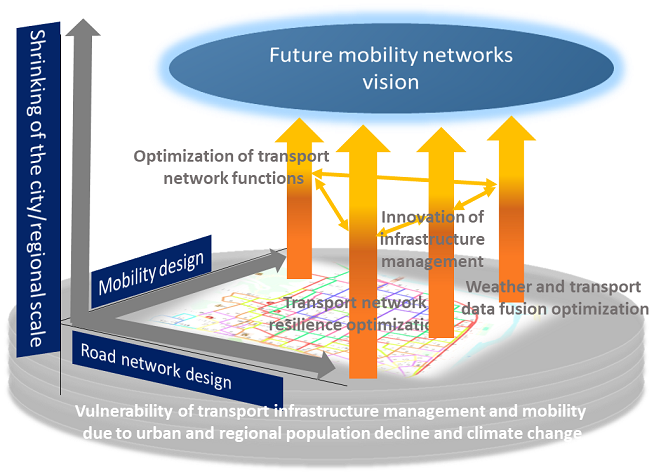- TOP
- Research
- Research Institute
- Advanced Engineering Research Areas
- Research Center for Future Mobility Networks
Research Center for Future Mobility Networks

Center Overview
Center Objectives
This research center was launched in April 2025 with the aim of developing redesign theory and a vision for transportation networks based on a completely novel approach to road and mobility networks, against the backdrop of issues faced by Japan's regional cities: population decline; shrinking urban and regional scale; vulnerability to severe disasters; and aging existing infrastructure. Within the research fields of planning, operation, management, and prediction in the context of transportation networks, we aim to develop methods for planning next-generation transportation networks that can also design the shape of local cities, based on a vision grounded in a thorough understanding of the current situation, obtained through analysis of a wide variety of big data in combination with mathematical theory models--all to develop guidelines for the future.
Research Direction and Future Prospects
Our research center will focus on four research themes that are necessary for the development of a vision for new generation transportation networks in regional cities.
1. Transport network resilience optimization [planning]
2. Transport network function optimization [operation]
3. Infrastructure management innovation [management]
4. Climate change adaptive transport data fusion optimization [prediction]
In this center, we carry out research in teams that bring together researchers in different fields of expertise from within the university; companies related to the research field (such as automobile manufacturers and construction consultants); and external collaborative research members consisting of researchers from local government and other universities.Based on the premise that emergent effects can be achieved through interdisciplinary collaboration, we will seriously address: recent extremely complex changes in socio-economic activities; and the demands put on transportation networks to respond to vulnerability to ever-intensifying disasters due to weather change; and will contribute to solving the major transportation issues commonly faced by local cities.
We will engage in research activities with the goal that planning methods and vision for next-generation transportation networks developed here will provide the basis for an effective prescription for a paradigm shift to ensure sustainable development, even as cities and regions shrink and infrastructure ages. Furthermore, we aim to develop a transport network vision for the next generation, based on the outcomes of this research, to be reflected (social implementation) in future plans and infrastructure development plans for the consideration of local transport managers (mainly the police) and road managers (mainly national, prefectural and municipal governments).

